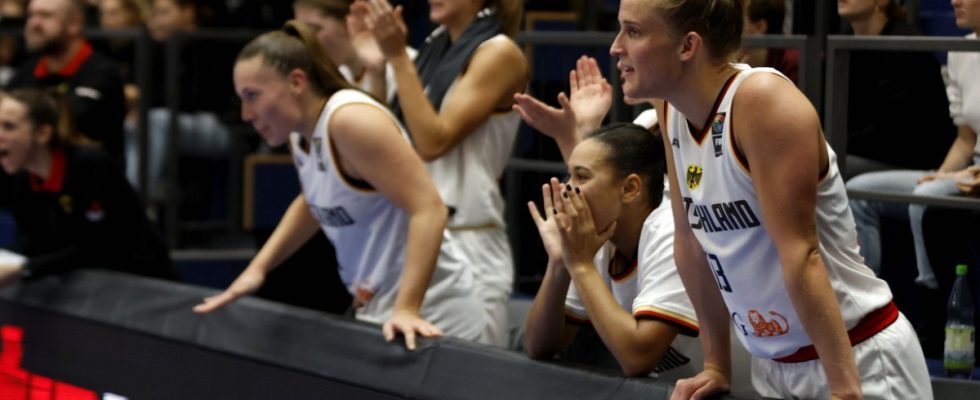Anyone who speaks to Leonie Fiebich will first hear about an “overwhelming feeling”. At least you understand them well, that was different a few weeks ago. At that time, I was yelling Pabellon Principe Felipe, a basketball arena in Zaragoza, 10,800 fans cheered the stuffy air. Fiebich, 23, and her club Casademont Zaragoza had won the Spanish Cup. Pretty surprising, in a tight final against a Salamanca side.
“It was goosebumps, you didn’t understand what you were saying. We were carried through this final because this cup is so important to the people,” recalls the German basketball player. By the time the game ended, she had contributed seven points, four rebounds and three assists. She threw the ball in the direction of the hall ceiling, then the fiesta including bus transfer started through the city in an open double-decker. If you counted the word “crass” in Fiebich’s descriptions, you’d end up with a nice stack.
Things are going well for the native of Landsberg, who once started a career at TS Jahn Munich and in Wasserburg, which took her through Australia to France and then to the north of Spain. There she was voted the most valuable player in Europe’s top league. If you add the current successes of other German colleagues, the picture emerges of an up-and-coming generation of players: Berliner Satou Sabally, 24, just won the Euroleague with her second club Fenerbahce – she plays in Istanbul when US basketball and her club Dallas Wings are pausing . Marie Gülich is leading the playoffs with Valencia. And in New York, Sabally’s sister Nyara, 23, is preparing for her first WNBA season with Liberty.
Fiebich also has every reason to be extremely happy, even if she says with regard to her vote for the most valuable player: “In my view, you have to look at it more like the MVP is an award for the team.” But there are also topics where the wing player no longer sounds so relaxed. For example the development of women’s basketball in Germany.
Satou Sabally (left) won the Euroleague title with Fenerbahce last Sunday – although the Berliner usually plays in the WNBA in Dallas.
(Photo: David W Cerny/Reuters)
Despite the legionnaires mentioned, it slumbers deep in the niche. In hardly any other team sport is the gap between women and men so big in terms of relevance, the Bundesliga (DBBL) is far away from the number of spectators in Zaragoza. If you want to find out more about the league, you will come across a website that is one of the most user-hostile things the Internet has to offer. Statistics, tables, references to live broadcasts? It’s only possible with a lot of clicks or via an external app. Colorful or background information about the clubs? Low-threshold to find your way in? It would be nice.
The women’s Bundesliga in basketball looks unprofessional and hardly offers youngsters any chances
If you ask Fiebich about a revival of her sport through the success reports of these days, she reacts grumpy. “From the outside it looks like an upswing, but nothing has actually changed in terms of perception in Germany.” When she takes to the streets in Spain, she is asked for photos, where women’s basketball is almost as important as men’s. There’s a culture behind that, an understanding that any girl can be a basketball player if she doesn’t become a soccer player. Women’s basketball in Germany still means: Gymnasiums with Babylonian floor painting from all imaginable indoor sports, away trips on the match day in a minibus, no physiotherapists employed by the club. Last winter, the Rhineland Lions filed for bankruptcy in the middle of the season – as table leaders.
“It’s a bit annoying. Sometimes people here don’t even know what we’re doing,” says Fiebich. She has something on her heart, which you can tell from the fact that she sends a voice message shortly after the interview. Another problem is that there are no restrictions on foreigners in the DBBL. Clubs with some financial leeway can bring in as many players from other countries as they want and use them. Young Germans are getting fewer and fewer opportunities.
When it comes to expanding the league, “nothing is happening at all,” says Fiebich. “What we do is lost, which is a total shame.” She recently watched games again and came to the conclusion: “The quality of the DBBL is going down drastically, the level is much lower than elsewhere.” What bothers her the most is “how the league raises it, it all seems so unprofessional”. It’s different in Spain, “there are former players in key positions who have much more expertise – while in Germany people are responsible who have no plan at all”.
For the first time in twelve years, the European Championship qualification was achieved with the national team
Then Fiebich’s accusation ends and she reports something conciliatory after all, after all there is an EM on the agenda. For the first time in twelve years, the national team qualified. And even if the tournament in Israel and Slovenia (June 15 to June 25) collides with the season of the WNBA (the rights to Fiebich are owned by the New York Liberty), she is there.
“I’ve been fighting with the DBB for more attention and this long-awaited EM since 2018,” she says, “now it’s time to enjoy it.” America can wait. Your dream is not necessarily the glittering world of the USA anyway. International matches and the chance of the 2028 Olympics are more important. She has extended her contract in Zaragoza by a year, and winning the cup grants the club a wild card in the Euroleague. She can now ask Satou Sabally what it’s like to win.

